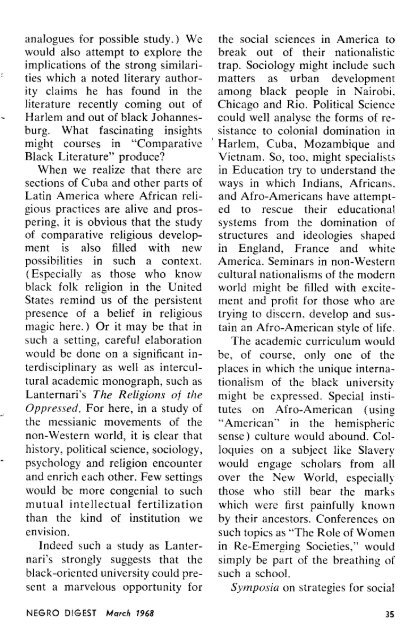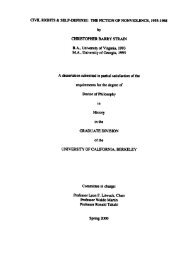Negro Digest - Freedom Archives
Negro Digest - Freedom Archives
Negro Digest - Freedom Archives
You also want an ePaper? Increase the reach of your titles
YUMPU automatically turns print PDFs into web optimized ePapers that Google loves.
analogues for possible study . ) We<br />
would also attempt to explore the<br />
implications of the strong similarities<br />
which a noted literary authority<br />
claims he has found in the<br />
literature recently coming out of<br />
Harlem and out of black Johannesburg<br />
. What fascinating insights<br />
might courses in "Comparative<br />
Black Literature" produce?<br />
When we realize that there are<br />
sections of Cuba and other parts of<br />
Latin America where African religious<br />
practices are alive and prospering,<br />
it is obvious that the study<br />
of comparative religious development<br />
is also filled with new<br />
possibilities in such a context .<br />
(Especially as those who know<br />
black folk religion in the United<br />
States remind us of the persistent<br />
presence of a belief in religious<br />
magic here . ) Or it may be that in<br />
such a setting, careful elaboration<br />
would be done on a significant interdisciplinary<br />
as well as intercultural<br />
academic monograph, such as<br />
Lanternari's The Religions of the<br />
Oppressed. For here, in a study of<br />
the messianic movements of the<br />
non-Western world, it is clear that<br />
history, political science, sociology,<br />
psychology and religion encounter<br />
and enrich each other . Few settings<br />
would be more congenial to such<br />
mutual intellectual fertilization<br />
than the kind of institution we<br />
envision .<br />
Indeed such a study as Lanternari's<br />
strongly suggests that the<br />
black-oriented university could present<br />
a marvelous opportunity for<br />
NEGRO DIGEST March 1968<br />
the social sciences in America to<br />
break out of their nationalistic<br />
trap . Sociology might include such<br />
matters as urban development<br />
among black people in Nairobi,<br />
Chicago and Rio . Political Science<br />
could well analyse the forms of resistance<br />
to colonial domination in<br />
Harlem, Cuba, Mozambique and<br />
Vietnam . So, too, might specialist ;<br />
in Education try to understand the<br />
ways in which Indians, Africans,<br />
and Afro-Americans have attempted<br />
to rescue their educational<br />
systems from the domination of<br />
structures and ideologies shaped<br />
in England, France and white<br />
America . Seminars in non-Western<br />
cultural nationalisms of the modern<br />
world might be filled with excitement<br />
and profit for those who are<br />
trying to discern, develop and sustain<br />
an Afro-American style of life .<br />
The academic curriculum would<br />
be, of course, only one of the<br />
places in which the unique internationalism<br />
of the black university<br />
might be expressed . Special institutes<br />
on Afro-American (using<br />
"American" in the hemispheric<br />
sense ) culture would abound . Colloquies<br />
on a subject like Slavery<br />
would engage scholars from all<br />
over the New World, especially<br />
those who still bear the marks<br />
which were first painfully known<br />
by their ancestors . Conferences on<br />
such topics as "The Role of Women<br />
in Re-Emerging Societies," would<br />
simply be part of the breathing of<br />
such a school .<br />
Symposia on strategies for social<br />
35
















